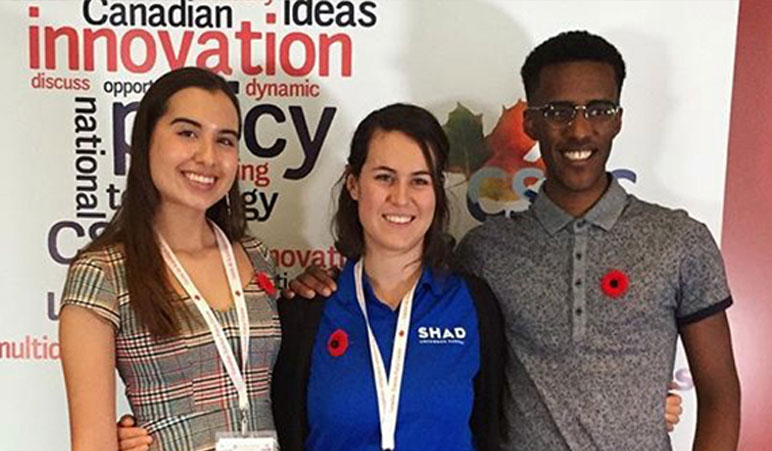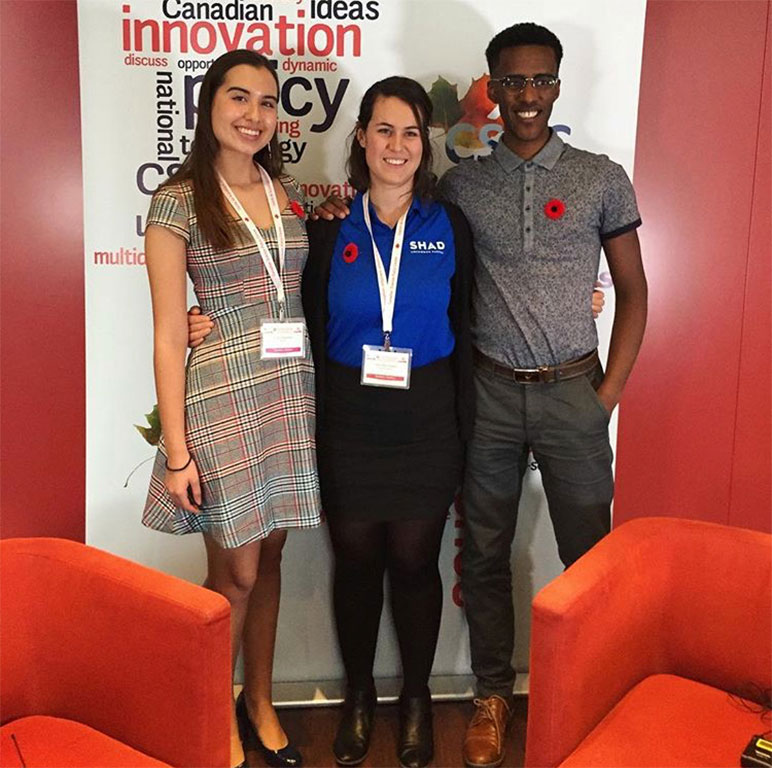
Science and Inclusion: Going beyond the slogans
On November 8, Shad hosted the youngest panel at the Canadian Science Policy Conference in Ottawa. Eva Greyeyes, Alex Bouchard and Joseph Tafese, three Shads, shared their perspectives and experiences with geographical, economic and philosophical inclusion.
The room was buzzing with awe at these young panelists:
Excuse me but I’m just sitting here in #CSPC2018 @SHADnetwork panel on #EDI, being blown away by how smart & impressive these youngsters are, and how generous they are w sharing their experiences. The future is bright 🌟🌟🌟 pic.twitter.com/0pCxzCei97
— Vanessa Sung, PhD 👩🏻🔬👩🏻💻🇨🇦🇹🇼 (@sung_vanessa) November 8, 2018
Eva Greyeyes, Shad2018 is Nêhiyaw from Muskeg Lake Cree Nation and has acted in the feature film, “Indian Horse.” Eva hopes to make a positive impact on her community, and to empower other Indigenous teenagers. She started off her discussion saying that the national conversation about Indigenous people needs to shift. In the media, everything is focused on the bad or the crises the Indigenous community faces; the conversation does not shift towards inclusivity. She mentioned that everyone wants Indigenous voices to be included but aren’t willing to make the changes needed to fill the gaps.
Eva discussed how each Shad program had exposure to Indigenous Knowledge, an experience that helped her to deepen her appreciation for her culture and one that was valued and appreciated by her fellow participants. She said that bringing these experiences to STEM students supports broader culture change: “Science needs diversity to thrive.”
Although Eva was lucky enough to experience Shad, she touched upon the notion that Indigenous communities – especially those in remote communities – experience another level of isolation. Indigenous students often have to move hundreds of miles away from their families and communities to attend higher education, an environment that can’t properly foster academic success. She believes it is important for Indigenous youth to be supported and believed in, as well as inspired and excited to attend university. These communities need outreach, not just aid, for true inclusion.

Alex Bouchard, Shad2009 is from Haines Junction, YT, a proud francophone and an inaugural member of the Prime Minister’s Youth Council. She spoke on her experiences as a youth in the north and as a voice on the Youth Council. She has found that opposing perspectives lead to engaging discussions. As a youth in the north, she believes that youth face similar issues across Canada, but their experiences with where they live lead to different ideas about how to address those issues. She thinks science can benefit from understanding the world from a Northerner’s perspective, experiencing other balances of life that do not exist for city dwellers.
Alex also mentioned that geography can lead to barriers; students in the Yukon are less likely to be aware of opportunities like Shad compared to students in a city like Toronto (something Shad is working tirelessly to change!). Likewise, she has mixed feelings about technology. It connects people from all across the world, but it can also be corrosive to relationships. She believes face-to-face communication is more inclusive than a phone call.
Joseph Tafese, Shad2017, is currently a Software Engineering student at University of Waterloo. After moving to Canada from Ethopia he decided to invest the only thing he had – time – on the inner-city children he lived with. He shared his views on economic and philosophical inclusion. He talked about the differences between diversity and inclusion, how one is quantitative and one is qualitative: “Diversity is a statistic; inclusion is something you feel.”
He believes that progress and goals look different for everyone: “We all want the same thing, a better world, but we don’t necessarily know what ‘better’ means to each other.” He found that cultural awakening is important to being able to participate in discussions, especially when applying the scientific method. He mentioned that one can only ask questions if they have the cultural awareness or experience of doing so. This is what he appreciated about Shad, that each cohort of students come from different backgrounds, resulting in diverse, insightful conversations.
After seeing the change Shads bring to the world and hearing their insights during platforms such as this one, we too agree with our panel attendee – the future is indeed bright. Bringing youth together in discussion is a stepping stone to further understanding what needs to be done to achieve diversity and inclusion.


